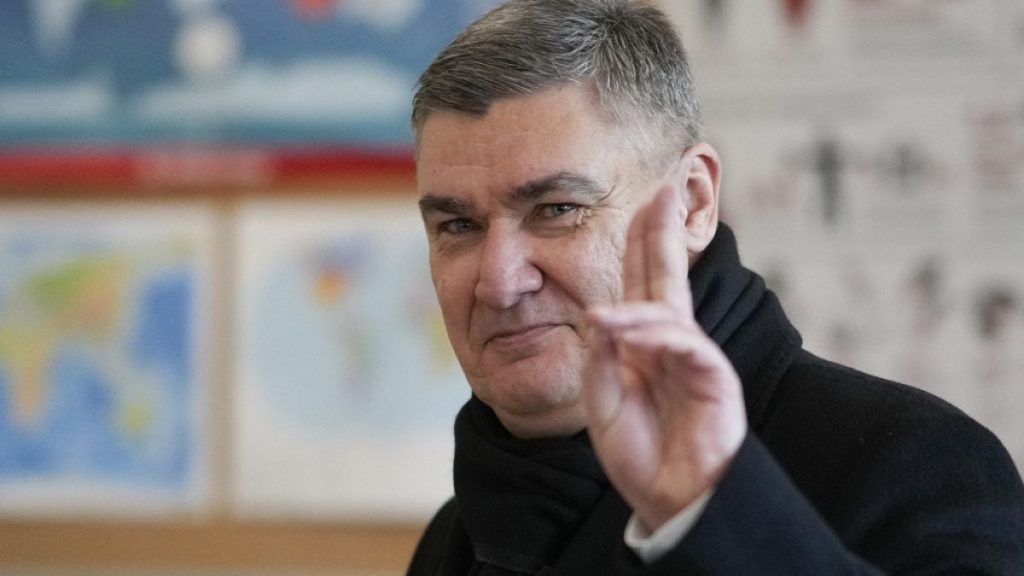Zoran Milanovic’s Re-election Bid: A Divisive Figure in Croatian Politics
President Zoran Milanovic, a prominent figure in Croatian politics known for his combative style and controversial stances, is seeking re-election amidst a backdrop of complex domestic and international issues. Often likened to Donald Trump for his confrontational approach, Milanovic has carved a distinct political identity characterized by populist rhetoric and a left-leaning ideology. His presidency has been marked by frequent clashes with Prime Minister Andrej Plenkovic, adding a layer of tension to the Croatian political landscape. As he navigates this re-election campaign, Milanovic faces scrutiny over his stance on the war in Ukraine, his relationship with the ruling party, and his overall impact on Croatia’s international standing.
Milanovic’s criticism of Western military aid to Ukraine has become a defining feature of his presidency and a central theme in the election campaign. Positioning himself as a voice of caution amidst escalating international tensions, he has advocated for Croatia to remain neutral in the conflict, emphasizing the country’s need to avoid entanglement in global disputes. This stance has drawn both support and criticism, with some praising his commitment to peace and others accusing him of aligning with pro-Russian sentiments. His decision to block Croatia’s participation in a NATO-led training mission for Ukraine further solidified his position, highlighting his willingness to challenge established alliances and prioritize national interests.
The Croatian presidency, while largely ceremonial, carries significant political weight, particularly in areas such as foreign policy and military affairs. Milanovic’s pronouncements on the Ukraine conflict have therefore carried considerable weight, shaping public discourse and influencing Croatia’s international relations. His critics argue that his stance undermines Croatia’s commitment to its NATO and EU allies, while his supporters view it as a necessary counterbalance to what they perceive as unnecessary interventionism. This debate over Croatia’s role in global affairs has become a central dividing line in the presidential race, shaping the narratives of the various candidates and influencing voter perceptions.
Challenging Milanovic’s bid for re-election is a field of seven other candidates, including Dragan Primorac, representing the ruling Croatian Democratic Union. Primorac has positioned himself as the pro-Western alternative to Milanovic, emphasizing Croatia’s integration with the EU and NATO. He has framed the election as a choice between East and West, portraying Milanovic as a threat to Croatia’s international alliances and advocating for closer ties with European and transatlantic partners. This contrast in foreign policy visions has become a central theme of the campaign, highlighting the fundamental ideological differences between the two leading candidates.
However, Primorac’s campaign has been hampered by a high-profile corruption scandal involving the health minister, a setback that has dominated pre-election debates and cast a shadow over his candidacy. This scandal has provided ammunition for Milanovic and other opposition figures, who have seized on the issue to criticize the ruling party’s governance and raise questions about Primorac’s suitability for the presidency. The corruption scandal has injected an element of uncertainty into the race, potentially impacting voter sentiment and shifting the political landscape.
Beyond the two frontrunners, Marija Selak Raspudic, a conservative independent candidate, has emerged as a notable contender. Focusing her campaign on economic concerns, corruption, and demographic challenges, Raspudic has sought to appeal to voters disillusioned with the political establishment. She has emphasized the need to address the economic hardships faced by ordinary citizens, highlighting issues such as rising living costs and declining population. This focus on domestic issues has resonated with some voters, positioning Raspudic as a potential alternative to the established political figures dominating the race.
The presidential election takes place against a backdrop of multiple elections held earlier in the year, reflecting a dynamic and evolving political climate in Croatia. These elections, including a snap parliamentary election and the European Parliament balloting, have shaped the political landscape and influenced the dynamics of the presidential race. The recurring electoral cycles indicate a period of significant political activity and change, with various parties and candidates vying for power and influence. The outcome of the presidential election will have significant implications for Croatia’s domestic and foreign policy trajectory in the years to come.














